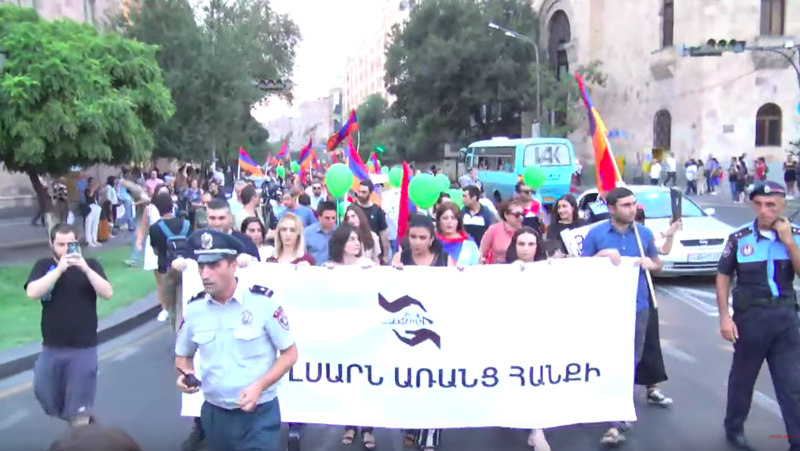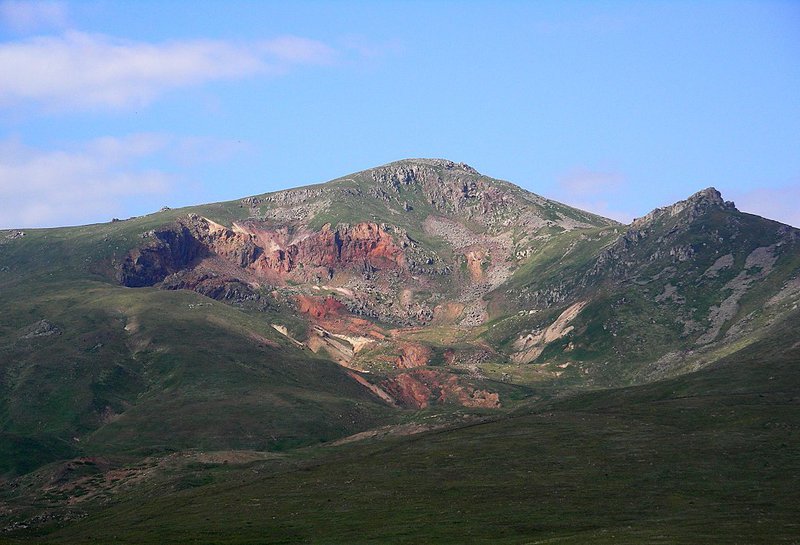On coming to power in May 2018, protest leader Nikol Pashinyan ordered inspections in Armenia’s mining industry. Pashinyan subsequently appointed a new head to the country’s official mining and environmental inspection unit, choosing environmental lawyer and civic activist Artur Grigoryan. The inspection, a state administrative body, began an inspection of Amulsar, alongside other mines, in early July 2018.
Despite Pashinyan’s claims that the Amulsar protests were a form of ‘sabotage’ against the new government, the campaign against the mine continued, provoking counter demonstrations by Lydian employees in Yerevan, the Armenian capital. The tense post-revolutionary situation appeared to be taking a toll on a major foreign investor, with Lydian Armenia director Hayk Aloyan reporting on 2 July that the company had experienced financial losses as a result of the protests.
While Pashinyan attempted to calm the situation around the mine in late June and early July 2018, he also stated that he would have opposed the Amulsar project if he had been in power at the time. Several weeks later, on 20 July, an official working group was set up to examine how far Armenia’s mining companies operated according to domestic law and best international standards, with the first mine on the group’s list being Amulsar. The working group, comprising representatives of government, business, civil society and environmental experts, inspected the Amulsar site and reviewed Lydian’s environmental and social impact assessment.
 6 July 2018: Nikol Pashinyan attempts to mediates between protesters and mining company Lydian International. Youtube
6 July 2018: Nikol Pashinyan attempts to mediates between protesters and mining company Lydian International. YoutubeOn 24 July, Armenia’s Investigative Committee announced an investigation into allegations that officials from the Ministry of Nature Protection had concealed environmental information regarding the Amulsar mine. (In August 2019, the Investigative Committee published the results of a third-party audit and stated ‘there are no grounds for criminal prosecution and continuation of criminal proceedings’.)
At the end of July 2018, the Ambassador wrote to Foreign Office colleagues regarding the Amulsar situation. ‘I apologise i[f] this seems downbeat, but it is important that I give you an accurate picture,’ the otherwise redacted email read.
The British Embassy’s reports contain a detailed account of the working group’s activities on Amulsar – stating members’ individual evaluations at length. When the group presented its findings in November 2018, Ambassador Farnworth received a summary of the proceedings.
‘The majority of the speakers claimed that the EIA [Environmental Impact Assessment] report of the project has serious gaps, the positive expert opinion was issued without proper study of the relevant documentation provided by Lydian Armenia,’ the email stated in summary of the working group. ‘And if the project reaches the operational stage, [most speakers claimed] it will be detrimental not only for the environment and for the health of the population, but also for the Armenian economy.’
Informed that the working group had finished its work, the Ambassador responded via email: ‘Please could you remind me whether any Lydian nominees were included [in the working group]?’
Responding to openDemocracy, a Foreign Office spokesperson said: “British Embassies play a positive role in helping to grow business around the world for UK companies.”
Keeping an eye on activists
The Embassy releases include monitoring of Facebook posts and public activities by members of the Armenian Environmental Front (AEF), an organisation which has helped lead public resistance to the Amulsar mining project.
For instance, after prime minister Pashinyan made a speech on changing Armenia’s economic dependence on mining and agriculture in September 2018, Levon Galstyan, head of the Armenian Environmental Front, was reported in the Embassy monitoring as writing on Facebook that ‘Armenia will no longer be heavily dependent on [its] mining sector.’
Posts containing negative opinions about the British Embassy were also reported back to the Ambassador, such as when a member of AEF, Arpine Galfayan, wrote on Facebook that the ‘Ambassadors of the United States and the United Kingdom continue to exert pressure on the Government on Amulsar’.
“Learning that the embassy of a supposedly democratic country is following and collecting facts on us in order to serve certain business interests is frustrating, surprising and beyond any acceptable boundary,” said Levon Galstyan in reaction to the Freedom of Information releases.
 24 August 2019, protest march against Amulsar mine, Yerevan | Source: News AM / YouTube
24 August 2019, protest march against Amulsar mine, Yerevan | Source: News AM / YouTubeAnna Shahnazaryan, a member of AEF, told openDemocracy that the British Embassy monitoring ‘resembled some kind of surveillance operation’ after she made a request for her personal data to the Foreign Office.
“The response showed how closely the Embassy collected information on my every action, word spoken and even my tone of voice when I spoke about the Amulsar case in public,” Shahnazaryan said, noting the ‘high frequency’ of Embassy emails concerning her statements at protests, meetings and actions during visits to international institutions in 2018 and 2019.
“It may appear that my data was collected from open sources, however there are details which show that special efforts were taken to analyse my behaviour beyond publicly available information,” Shahnazaryan continued.
“How did the Embassy use this meticulous collection of my personal data? Did the Embassy use it in their discussions with the Armenian government, for example?”
Past crises
At the official level, the UK has supported Lydian International through previous impasses with the Armenian authorities – albeit those under the guiding hand of the Republican Party, which was pushed out of power in 2018 after years of accusations of authoritarian tactics, corruption and vote rigging.
Notably, in 2012 and 2013, Lydian ‘experienced challenges’ over environmental permits after the Armenian government redrew the catchment area of Lake Sevan, the country’s largest freshwater source, and updated the lake’s impact zone. A government resolution in July 2013, for example, expanded the Sevan catchment basin 3,000 metres either side of a tunnel which runs through the Amulsar project area. With mineral processing not permitted in this area, this move excluded the proposed site for Lydian’s heap leach facility, where cyanide is used to extract precious metals from ore, as Amulsar is located near Lake Sevan and connected waterways.
“This was the first time it became apparent that the Armenian government, or the powers-that-be, had gotten crossways with the company,” said Mickey Fulp, a mining analyst who runs the website MercernaryGeologist.com and has followed Lydian since 2009.
In a press release following the July 2013 government resolution, Lydian stated that the Lake Sevan amendment would potentially affect permitting and ‘almost certainly result in a delay to the delivery and publication’ of its Feasibility Study – a key report on the economic viability of the project used to attract investment for mine construction – and delivery of the Amulsar project as a whole.
The British Embassy, according to a list of meetings released under Freedom of Information, had a series of contacts with Lydian over the Lake Sevan amendments in summer 2013. For example, in an email to Lydian, an Embassy official promised to raise the issue with Armenian president Serzh Sargsyan, who last year was charged with theft of state funds.
 CC BY-SA 4.0 GeoO / Wikimedia commons. Some rights reserved
CC BY-SA 4.0 GeoO / Wikimedia commons. Some rights reserved‘It would be good if you could send me the most essential/pertinent bullet points,’ the Embassy email to Lydian, dated 6 June 2013 and released under Freedom of Information, reads. ‘<REDACTED> has a meeting with the President tomorrow and we can use this as an opportunity to highlight your issues with regards to the delay, but want to make sure that we focus on the most pressing points.’
According to email records released under FOI, in July 2013 the Foreign Office and British Ambassador contacted the Armenian government regarding the State Water Committee two days before the body recommended the extension of the Lake Sevan catchment basin, therefore excluding Lydian’s proposed HLF site. A week later, FOI records show that the British Ambassador once again contacted the government regarding the State Water Committee the day before the Armenian government put this recommendation into law.
After the Armenian government chose to push ahead with the boundary change, an official working group involving company and government representatives was set up to identify a new heap leach site. The emails show that on one occasion the Embassy received detailed information about the proceedings of the working group.
A heap leach site was agreed in October 2013. Environmental activists subsequently wrote an open letter to the UK Foreign Office, calling for an investigation into UK ambassadors’ support for the Amulsar project.
In the letter, the Save Teghut initiative claimed that UK ambassadors ‘continuously exert pressure on the Government of Armenia’ in support of Lydian International. The letter, written by future mining inspection head Artur Grigoryan, highlighted that British Ambassador Katherine Leach met Armenia’s Minister of Nature Protection a week after the government’s decision to extend the catchment area ‘with a special request’ to support Lydian. The next day, Ambassador Leach visited the Amulsar site, saying ‘as a UK-based company, Lydian International represents potentially the largest British investment in Armenia’.
Responding to the letter at the time, the FCO said that it ‘standard and accepted practice for the British Government and its diplomatic missions to encourage trade and investment opportunities overseas.’
What next
In an effort to assist in cleaning up Armenia’s mining industry, the UK, among others, has supported the country’s path towards membership in the Extractive Industries Transparency Initiative (EITI). The latter is a global standards organisation aimed at increasing transparency and accountability in the natural resource business – and Lydian International is considered an important project for Armenia’s EITI candidacy and a drive towards responsible mining.
In May this year, members of affected communities in nearby spa town Jermuk filed a new complaint to project funder EBRD, claiming that public consultations had not been properly held during the development phase, and that the town’s tourism reputation had been affected by the mining project. The complaint also stated that residents had already witnessed environmental impacts such as dust and water pollution.
PrintThomas Rowley | Radio Free (2020-06-22T00:00:00+00:00) Emails underscore UK role in Armenian mining dispute. Retrieved from https://www.radiofree.org/2020/06/22/emails-underscore-uk-role-in-armenian-mining-dispute/
Please log in to upload a file.
There are no updates yet.
Click the Upload button above to add an update.